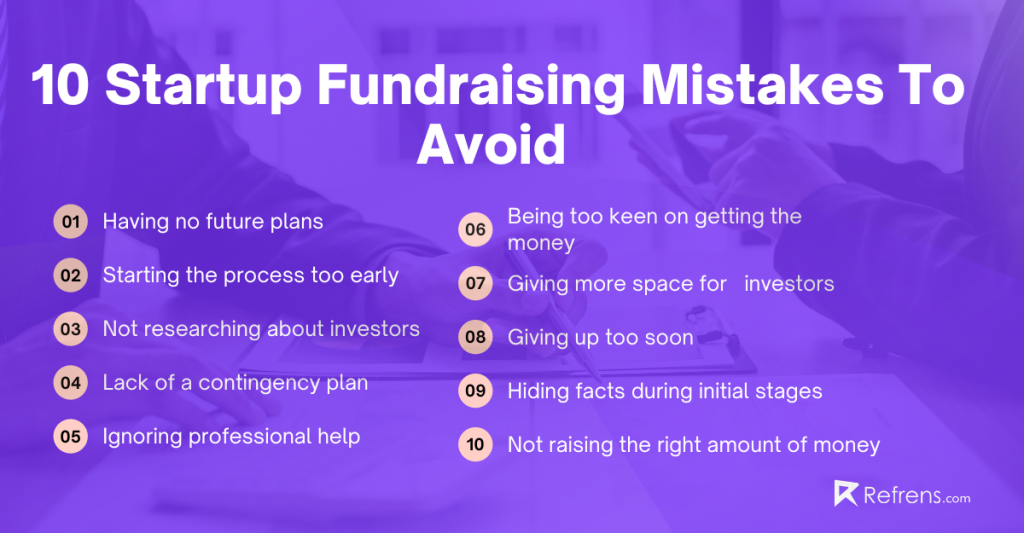Keeping your startup afloat can be a little stressful. In fact, only 10% of startups succeed globally every year. These statistics can be a little frightening to hear. Also, most of them fail due to insufficient funds.
All these together make one wonder about the importance of getting their funds secured. During the fundraising phase, many startups do some mistakes that prevent them from getting the right financial support. We have put together some of the common mistakes that you need to avoid so that you can be in the 10% that succeed.

1. Not raising the right amount of money
There are two scenarios that occur most commonly among startups. One is when they raise too little money, and the second is when they raise too much. If you raise too little, you wouldn’t have the right resources. For example, it would be tough for you to hire a new employee or even think about installing new business tools.
When you raise too much, you will find that investors exert intensive pressure on you. It will force you to make hurried (and often dumb) decisions. So, be realistic when you raise funds. Only ask for the figure that you need, plus a little extra to handle accidental costs.
2. Having no future plans
By future plans, we mean scaling your business. Only 1% of startups evolve into unicorn startups. They all plan well ahead of time to tackle all the financial hurdles. When fundraising, always think about your scaling ideas. Make sure that the investors you choose will be willing to invest further in your business.
Or, if you have well-thought-out plans, you can up your initial fund requirements. However, you must always find ways to scale yourself. That is when a startup keeps growing into a more stable revenue source.
3. Starting the process too early
Your investments must come in at the right time. If not, you cannot efficiently invest as planned. You need to have a good investment strategy that predicts the optimal time for raising funds. When you are too early, your funds will just sit in the bank with frustrated investors who might back out of the startup. This can severely affect your reputation when you raise funds in the future.
4. Not researching about the investors
One of the worst mistakes you can do is not look into the investors. For raising funds, you need to initially pitch your ideas to an investor. Before you randomly pick someone, you need to understand their investment portfolio.
Validate how your startup will fit into their investment plans and tactics. You can also use the information gained to increase your chances of getting approved for a fund. When you only think about your company’s revenue, you might end up spending a lot of time disagreeing with the investors. Hence, find someone who has similar interests in the niche to make fundraising and future development easier.
5. Lack of a contingency plan
What if your fundraising schemes fail? What are you planning to do to keep your startup afloat in such situations? Your contingency plan must answer these questions. Have alternative routes to get the money you need. These alternative routes can also help you keep motivated. Take a few months to plan what you will do when your current plan goes sideways. Always discuss it with professional advisors.
6. Being too keen on getting the money
We understand that the fund is critical for your development. However, you need to take it slow and never rush it with the investors. Create connections through online networking sites to create a reputation for yourself.
If you ask for money the first time you meet the investor, they might not have the right impression. Instead, take a long way around. Show them that you are capable of putting their money to good use through your clients. And, investors will naturally be willing to fund your startup.
7. Ignoring professional help
You can get many freelancers and other professionals who have the right knowledge to help you with your investment plans. Having a second opinion gives you a clear understanding of where you stand. And, how the investors will perceive you.
Be open to opinions on how you can make your pitch even more effective. Furthermore, you can also hire freelance financial advisors who help you accurately calculate the fund needed.
8. Giving too much space for the investors
Always keep your investor’s share of the ownership limited. Some may even try to acquire your idea after you make it successful. So, always give them clear boundaries over what they can and cannot control. Firm ownership also ensures that your startup and the revenue you produce remain yours.
9. Giving up too soon
Rejections are unavoidable when you go searching for funds. It can even flush out your entrepreneurial spirits. But, do not worry. Almost every successful startup that you see now faced rejection at some point.
For example, as a startup, Google founders had it tough. They even thought about selling the company for $1 million. However, after five months, they were able to raise up to $25 million. Now, Google is one of the most valuable firms in the world!
10. Hiding facts during initial stages
Every investor wants you to show them everything about your firm. If you only uncover the issues later on, they might not continue to invest. Hence, always be honest and lay everything in front of them. Plus, hiding accurate figures is only going to create a poor reputation for you in the long run.
Why should you have an Accounting Software solution?
Making notes of all your spending will greatly benefit you. Especially, when you are receiving funds from external sources. Therefore, we recommend you choose from the best accounting software available for small businesses. The following are some of the other reasons why you need them as a part of your tech stack.
- Saves time: Having an efficient accounting software solution makes accounting faster. It gives you more time to focus on your fundraising activities, while it manages a clear balance sheet.
- Minimizes errors: As most data handling and processing happens automatically, there will be a significant drop in accounting errors.
- Provides a better financial understanding: Most software solutions offer a comprehensive dashboard that lets you have an overall look at your financial health. Which eventually helps you make better financial decisions and seek appropriate funding.
- Offers security: Almost all accounting apps follow GDPR guidelines and use advanced data encryption protocols. This keeps your customer info and business’ finance details safe and secure.
- Enables collaboration: If you want to discuss your accounts with your accountant and the legal team, you can easily do so. By giving restricted permissions, you can create seamless coordination between different teams.
We highly recommend you upload your accounts to a software solution before asking for funding. It can help you structure the accounts before showcasing them to the investors.
Conclusion
Getting the funds can be an exciting time for you as a startup owner. Yet, it is always wise to keep your long-term plans in mind when going for fundraising. Play safe and never give up just because a few investors backed out. Also, never drastically change your business goals just so you could get the money. We hope you found this article useful and ideas relevant to your business!























Leave a comment!